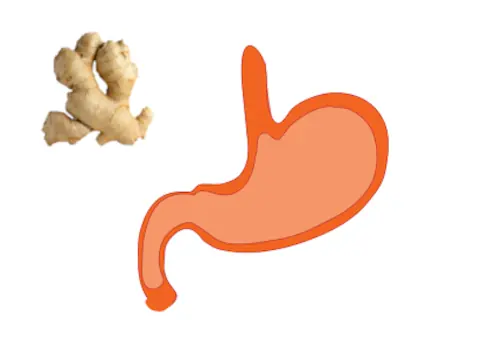Ginger for Stomach acid: Does ginger increase stomach acid?

Many of you must be curious about does ginger increase stomach acid. Ginger, a popular spice and traditional medicine, is known for its numerous health benefits, including inflammatory reduction, nausea relief, and digestive help. On the other hand, Ginger has been linked to an increase in stomach acid production and the worsening of symptoms of acid reflux or gastroesophageal reflux disease (GERD).
It is well known for its ability to increase stomach acid, which can help improve digestion and reduce indigestion symptoms such as nausea, bloating, and heartburn. Recent studies have also suggested that ginger may be beneficial in treating other digestive issues, including Crohn’s disease and irritable bowel syndrome.
Its anti-inflammatory properties can also relieve pain caused by ulcers or gastritis. Ginger is an easy addition to your diet that could bring great benefits!
In this post, we will explore whether ginger increases stomach acid and evaluate the existing information to provide insight into the topic.
In This Article
- Ginger for Stomach acid
- Does Ginger Increase Stomach acid
- How Long do I have to Eat Ginger for Low Stomach acid
- Does Ginger Reduce Stomach acid
- How to Calm Down Acid in stomach without Ginger
Ginger for Stomach acid

Ginger has been a natural remedy used to lower stomach acid for centuries. It works by decreasing gastric acid production and increasing the flow of digestive juices, which helps reduce symptoms, including heartburn, indigestion, and nausea. Furthermore, ginger can help relieve an upset stomach caused by high acidity in the digestive tract.
Ginger also has anti-inflammatory effects, which may help reduce inflammation caused by ulcers or other disorders caused by excessive stomach acid levels. When experiencing symptoms from excess stomach acid, consuming ginger tea or chewing on fresh ginger root multiple times throughout the day for the best benefits is preferable.
Does Ginger Increase Gastric acid?
Yes, ginger increases stomach acid. According to research, ginger can stimulate the release of stomach acid in certain people; In contrast, this acid is necessary to break down food and destroy harmful bacteria; too much of it can cause gastrointestinal disorders such as heartburn, reflux, or ulcers.
Ginger is a medicinal root that has been used for thousands of years. It includes several bioactive chemicals with anti-inflammatory, antioxidant, and antiemetic (anti-nausea) activities. It is also frequently used as a natural treatment for stomach issues.
However, ginger is typically considered safe and beneficial for most people; it may raise stomach acid levels in some people. It’s essential to consult a healthcare professional if you’re thinking about using ginger to treat digestive problems or for other reasons to be sure it’s safe and suitable for you.
How Long do I have to Eat Ginger for Low Stomach acid?
Ginger can be consumed for 5 to 7 days to treat low stomach acid. Gastric acid production is considered to be stimulated by ginger, which can help with digestion.
Ginger has long been known to have various beneficial health properties, including aiding digestion.
Eating ginger can help reduce symptoms of low stomach acid and indigestion. However, how long you need to eat ginger depends on your situation and the severity of your condition.
Generally eating a small amount of fresh or dried ginger daily is recommended for best results; however, if you are experiencing more severe symptoms, it may be necessary to increase this intake over time until relief is achieved.
Does Ginger Reduce Stomach acid?
Yes, ginger has been found to reduce stomach acid. Studies have shown that consuming ginger can help reduce the production of excess stomach acids and help promote digestion.
It also helps soothe an upset stomach and relieve nausea caused by excessive acidity in the digestive system. Additionally, it is believed that compounds in ginger may act as a buffer against ulcers caused by high gastric acidity levels.
Therefore, incorporating more ginger into your diet may benefit those with too much or too little stomach acid.
How to Calm Down Acid in stomach without Ginger?
Several alternatives to ginger can be used to reduce stomach acid. Here are the list on what is the fastest way to neutralize stomach acid:
1. Avoid Trigger foods
Certain foods, such as spicy or fried foods, might cause the production of too much stomach acid. Aim to identify and avoid the foods that make your symptoms worse.
2. Eat smaller, more frequent meals
Eat smaller, more frequent meals rather than larger ones since larger meals might stress your stomach and produce too much acid. Smaller, more frequent meals can help your stomach work less hard and produce less acid.
3. Stay upright after eating
After eating, maintain your upright position. Laying down can result in stomach acid flowing back into the esophagus, which can cause heartburn and other symptoms. After eating, remain upright for at least two to three hours.
4. Avoid Smoking and Alcohol
Smoking and alcohol intake can both increase stomach acid production and worsen symptoms. Avoid smoking and drink in moderation.
5. Chew Sugar-free Gum
Chewing sugar-free gum helps boost saliva production, which can help neutralize stomach acid.
6. Use over-the-counter Antacids
Take over-the-counter antacids to assist in neutralizing stomach acid and alleviating symptoms. But, before using them, carefully read the directions and check with a healthcare expert.
7. Try natural Remedies
Some home remedies that may help reduce stomach acid include slippery elm, chamomile tea, and licorice root. Nevertheless, before utilizing any natural therapies, please consult a healthcare expert to ensure they are safe and appropriate for you.
Conclusion
In conclusion, it is clear that ginger can increase stomach acid. Studies have shown that consuming ginger can help reduce symptoms of indigestion and heartburn and stimulate the production of stomach acid to aid digestion.
Before incorporating ginger into your diet, as with any nutritional supplement, consult a healthcare expert, especially if you have a history of gastrointestinal difficulties.
Read Next
References
- Ginger in gastrointestinal disorders: A systematic review
- Bioactive Compounds and Bioactivities of Ginger
- (PDF) Therapeutic Role of Ginger (Zingiber officinale)





